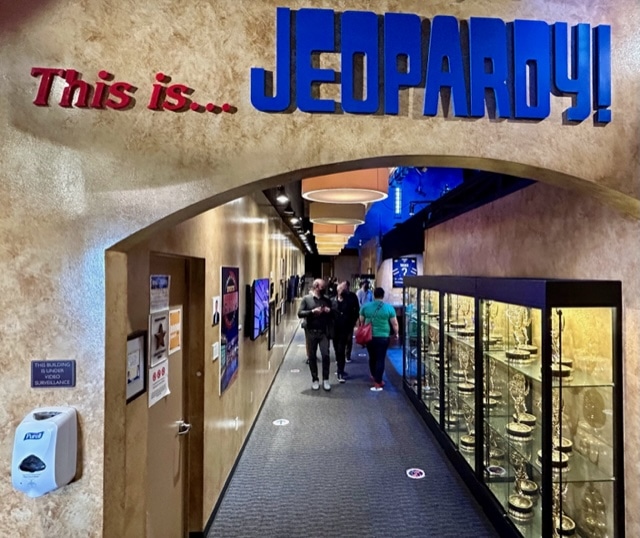

After watching a live performance, I now know I do not measure up to the intelligence level
and intensity needed to be an on-air contestant.
“This is Jeopardy!” the announcer’s voice rang out. I’d heard it so many times watching the game show on television over the years, but I’d never heard the voice that preceded announcer Johnny Grant’s – a voice you would only hear when in the production studio for a live Jeopardy taping. It was not a production voice, but a producer’s voice, which called out “This is Jeopardy episode 8,756…stand by.”
Jeopardy, at no cost, welcomes visitors to Los Angeles to register online and spend a half day in the show’s studio audience.
It’s an exciting experience to drive through the arched gates of Sony Pictures Studios, park your car, and walk between the big sound stage buildings bearing the names of “The Crown,” “Shark Tank,” and “Better Call Saul,” to name a few of the shows produced there in Culver City.
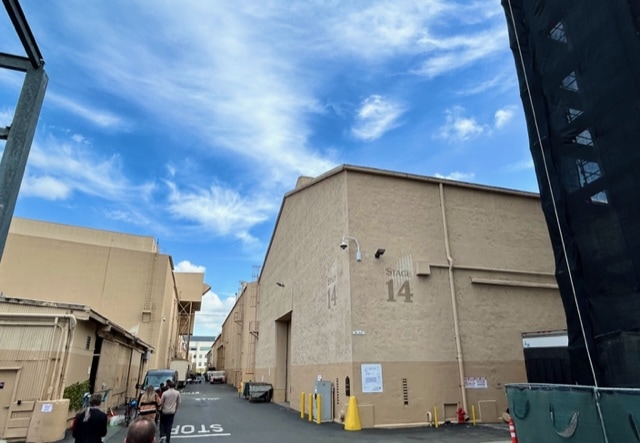
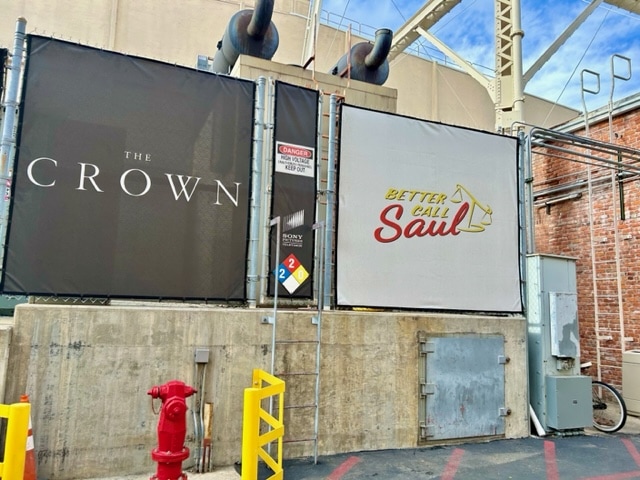
While some working studios are more industrial in nature, the interior of Jeopardy’s “Alex Trebek Studio” is big, stylish, and impressive. It looks like an art deco casino and is audience-friendly, making it easy to see the action and feel involved in it. Audience members are shown on camera only once, briefly, at the beginning of the broadcast when a boom camera sweeps across the auditorium over their heads.
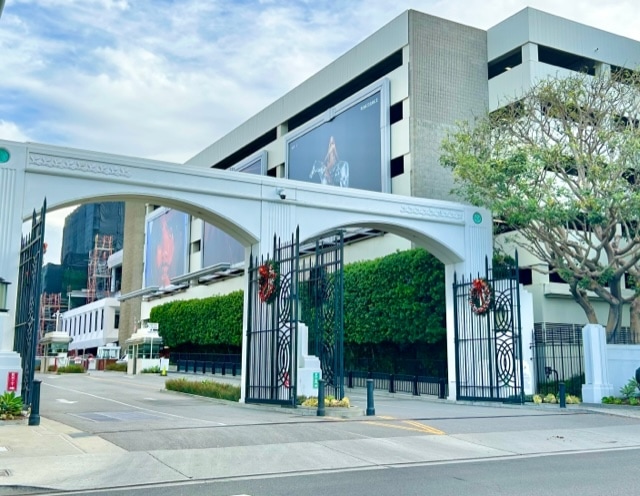
Alex Trebek Studio
It’s also a crowd-pleasing gesture that the studio is named for Alex Trebek, the longtime, late host. An accessible, backstage museum is full of memorabilia, videos, and images of Trebek, including a display of Jeopardy’s many Emmy Awards and the ability to pose for photos in front of an authentic Jeopardy game show podium.
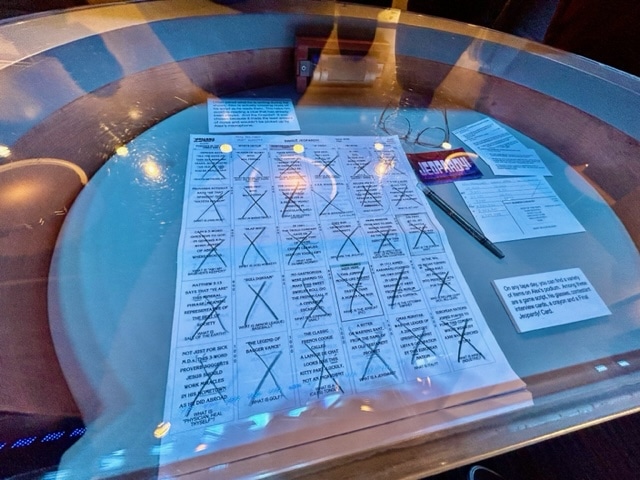
Jeopardy is one of the rare studio productions which allows people to bring their cameras along, although there are strict rules about when it can be turned on and what can be photographed. Everything in the museum, in which attendees get multiple opportunities to stroll between breaks, is fair game, as are the studio exteriors on the walk through the lot.
“I wonder whose Bentley that is backed in right next to the door,” I speculated with some of the other fans as we passed a single-car garage spot.
We were also given a firm-but-courteous reminder not to, as we watched the show, accidentally get over-excited and verbalize an answer out loud, a fun habit people are accustomed to when watching from their couches. Giving away a clue would affect the outcome of the game and bring production to a halt.
There is a vast difference between watching at home and playing the game on stage. Believe me, after watching a live performance, I now know I do not measure up to the intelligence level and intensity needed to be an on-air contestant. Producers encourage people to apply online, and I am not saying you shouldn’t, but I was amazed at the poise of the contestants and their ability to keep pace and know their roles in the show’s format. They have surely been well-coached by producers but probably started as superfans. One contestant admitted he studied hard, watched hundreds of episodes, and belonged to several trivia groups.
Guesting and Hosting
All told I was at Sony Pictures for four hours and watched the taping of three episodes which would air about six weeks later. Producers shoot five episodes – a week’s worth – in one day. One of the contestants on a winning streak worth $150,000 mentioned he was feeling worn out after his intensely competitive third consecutive win.
“I’m looking forward to a lunch break,” he said.
I mentioned the sharpness and agility of the contestants engaged in Jeopardy’s tight, fast-moving format, so it makes sense that Trebek’s successor as host, the savant-like Ken Jennings, was the winningest contestant in the show’s history, having outguessed the others 74 consecutive times.
During the commercial break, Jennings posed with each of the contestants for photos. He was amiable, calm, and engaged with the audience, as well, by fielding questions during commercial breaks.
“Do you drink tea?” was one of the more oddball inquiries.
“How many suits do you have,” one audience member asked since Jennings changed outfits between each taping to simulate it being a new day.
“None, technically,” he admitted, “Since none of these are actually owned by me. We have a great wardrobe department.”
Another audience member asked Jennings to name his favorite perk of being made famous by his historic Jeopardy winning status and elevation to host.
“I got to be a guest on the TV show Sesame Street,” he answered almost instantly.
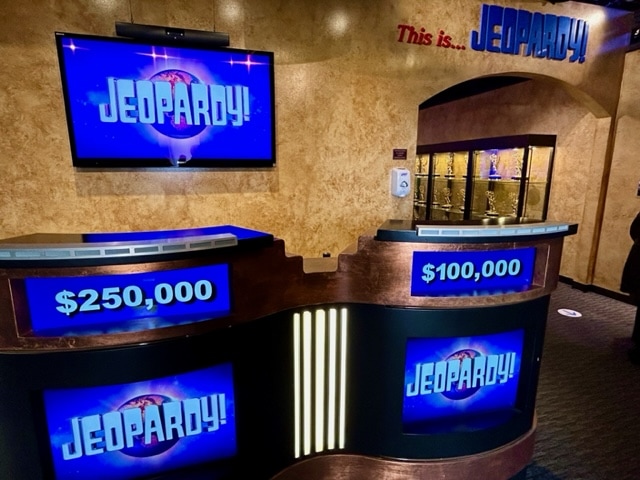
Seeing Behind the Scenes
Just as at home, it’s easy to get caught up in watching the game of Jeopardy and focusing on the competition. Try, though, when in the studio, to observe the production elements of the broadcast.
The big electronic board displaying the clues is much bigger in person than I imagined while watching on television. It is a massive wall. One of the elements of the big board viewers at home do not see is the white border light that circles the entire board. This neon ring flashes each time Jennings finishes reading a question, which signals the contestants they can now push their buzzer to answer. This rule was enacted to enable Trebek and then Jennings to finish reading the question before the brainy battlers buzzed in.
If the contestants buzz before the white light, their buzzer is locked out for a fraction of a second, which is enough time to derail their chances by allowing another contestant to buzz in. I noticed the contestants furiously pushing their hand-held buzzers in rapid fire in an attempt to be chosen to answer.
“It took you a little time to get used to buzzing, but once you got in the flow the second round was much better for you,” a sympathetic Jennings, who’d obviously experienced what that’s like, said to one of the contestants.
I heard the producer/stage manager also advise the contestants right before the episode began.
“Take a big, deep breath. There are water bottles next to you but only drink during the commercial breaks. Maybe one of them is vodka,” she joked. “Don’t over-anticipate. Be calm but aggressive.”
During the “Final Jeopardy” segment she asked for a little showbiz drama. “Keep your ‘poker face’ on until Ken reveals whether your answer is correct, please.”
Contestants aren’t paid any travel expenses or lodging, but the winner stands to make a nice payday, based on the game and their betting/risk level. The second place gets $2,000 and the third place receives $1,000. The first winner of the Merv Griffin-created show, in 1964, won $345.
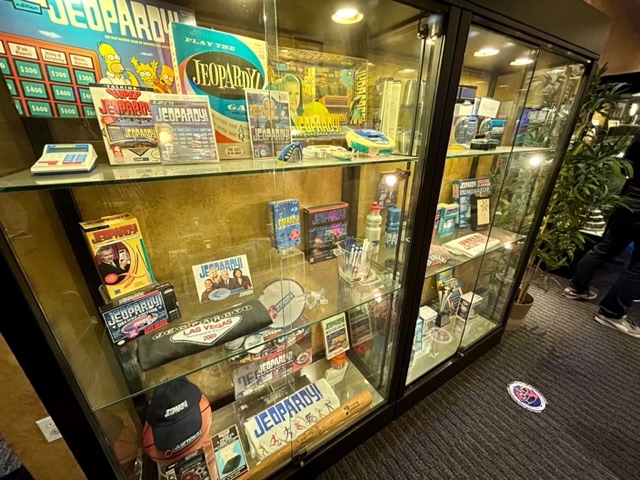
Slips and Fixes
If the Jeopardy production went entirely smoothly it would not be as interesting to watch. As an audience member, you get to see the glitches and fixes, which often are “audio-only” retakes of Jennings reading the questions. Sometimes a new close for a segment is taped. Jennings handled all of it with professional aplomb.
After the taping the studio warm-up host ran a small free raffle to win a copy of Alex Trebek’s book: The Answer Is…Reflections on My Life.
To request Jeopardy studio audience tickets, log on to: On-Camera-Audiences.com
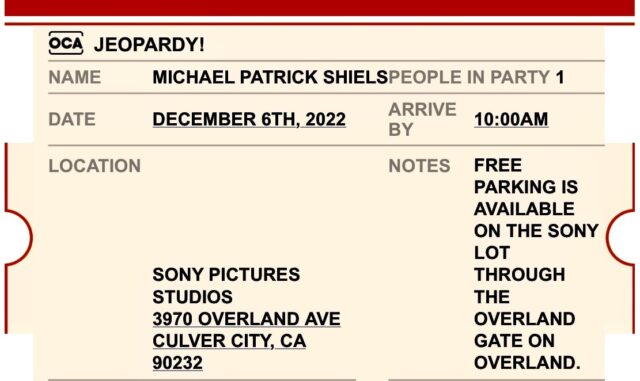
Read more on Michael Patrick Shiels’ travel blog, The Travel Tattler. Contact Travel Writer Michael Patrick Shiels at [email protected]
- Chef Massimo Bottura’s Travel Trail – From Modena to Monaco and More - June 30, 2025
- Hilton’s Miami Airport Blue Lagoon Hotel – A Vibrant, Cultural Gateway to Havana - April 30, 2025
- Spend a Life at Sea Amidst Crystal Cruises Cuisine and Cache - April 19, 2025
